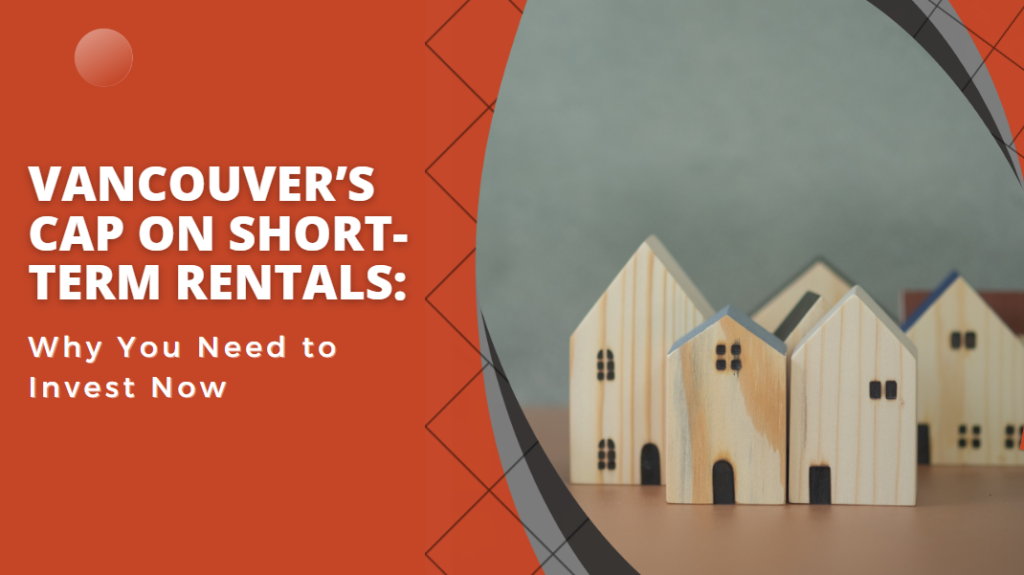Vancouver’s Cap on Short-Term Rentals: Why You Need to Invest Now

If you’re renting out a short-term property in Vancouver, things have recently become more complicated for you. We want to make sure that you’re up to date on the new requirements, the cost of your business license and permit, and the upcoming effective date that the latest city law goes into effect.
Property owners and investors working with Utmost Property Management have already received some correspondence from us around this law. If you’d like to talk further about what it means for your property, get in touch and we’d be happy to walk through the particulars with you.
Owners of short-term rental properties who are still self-managing will want to make sure that they’re in full compliance. If you’re not sure about what this means for you, contact us at and let’s talk about how to protect yourself and your rental business.
Here’s a look at the Vancouver short-term rental ordinance update, and how it will affect your short-term rental or Accessory Dwelling Unit (ADU).
Overview of VMC 20.835: Vancouver’s Short-Term Rental Law
The Vancouver City Council held a meeting on December 18, 2023, at which point the council unanimously approved an ordinance regulating short-term rental homes (STRs) in the City of Vancouver. This is something that’s been discussed for two years, and at the meeting, council members heard from a neighbor who opposed short-term rentals altogether and several STR owners who supported the ordinance but also voiced concerns about the hard cap, which we’ll talk about in a moment.
We never had any permit requirements or regulations around short-term rentals. Those properties are now strictly defined however, as units rented by individuals for fewer than 30 days. This law does not extend to bed-and-breakfasts.
There are several important takeaways in this ordinance, which all STR owners have to know. Most importantly, this law goes into effect January 17, 2024. You’ll have until February 15 to come into full compliance. That’s not a lot of time to prepare or to bring yourself into compliance, so if you aren’t already taking care of the necessary steps, it’s time to get started. It’s also a great time to lean on the support and resources of a Vancouver property management expert.
Another important part of this law is that it’s going through a two-year pilot period. The council will follow the evolution of the STR industry over these 24 months and make any necessary adjustments at that time.
Here’s what you need to know.
- Cap on Number of Short-Term Units in Vancouver. The City Council imposed a hard cap of 870 units. This number represents 1 percent of the current housing inventory. While this number is a hard cap, the council indicated that it could be adjusted during this pilot period or after the two-year period ends.
- Permit Fees and Licensing. Short-term rental property owners will need to obtain a permit and a business license. There are costs involved; the one-time permit fee will cost $250, and the annual business license fee will cost $50. Permitting will begin both online and in-person January 17, and owners of short-term rentals have until Feb. 15 to apply for a permit. With the application comes the opportunity for the City Council to inspect short-term rentals.
- When Properties are Sold. Another important thing to understand about this ordinance is that permits are issued to operators, not properties. That means that if you sell your STR, the permit is voided. The new owner would have to apply for a permit if they wanted to rent out the property on a short-term basis.
These are basic components of the law and how they apply to short-term rental properties that are occupied by the same tenant for 30 days or less. If your tenant is in place for more than 30 days, general long term leasing requirements would apply.
Something else to note: non-profit organizations are exempt from this ordinance and its requirements.
Now, let’s talk about ADUs.
When Your Short-Term Rental is an ADU
There are currently 260 ADUs in the City of Vancouver, and 11 of them operate as short-term rental units. If you’re thinking about turning an ADU on your own property into a short-term rental property or you’ve considered investing in the creation of an ADU, there is something important you need to know now that this law has passed: all ADUs in Vancouver are permitted to operate as short-term rentals.
ADU regulations specific to this property type will be discussed by the Council in 2024. We have heard some chatter that ultimately, ADUs may be restricted from being rented out in the short term at all.
Starting in early 2024, we expect a process to begin that puts an interim control ordinance in place that will implement HB 1337 – Accessory Dwelling Units – in advance of Title 20 changes. These will occur as part of the Comprehensive Plan Update. This would prohibit ADUs from being used as STRs going forward.
We also anticipate the establishment of new regulations for HB 1110 – Middle Housing – which could refine and make permanent the regulations implementing HB 1337 – Accessory Dwelling Units, including prohibiting units developed under these regulations from being used as STRs.
At Utmost Property Management, we’ll be closely monitoring these considerations, so make sure you pay attention to our blogs and our correspondence as the New Year begins.
Right now, this law is more or less indifferent when it comes to unit type. While most of the STRs in Vancouver are single-family homes, there are also rental rooms available, guest houses, garage apartments, and in-law suites. This law will cover all of those, which is actually good news for owners, because before there were any regulations in place, operating a short-term rental property was essentially illegal.
What This Means for Vancouver Real Estate Investors

As professional property managers and investment professionals in Vancouver, we have a lot to say about these laws. Most of the rental property owners we work with support this initiative – regulations have been present for some time in most cities across the U.S. and Vancouver is right to approach the growth of STRs and the need for regulation.
The business license and the permit fees are of course unpleasant, but they’re not prohibitive, and we can manage the process of obtaining fees and licenses for our clients.
What we’re most interested in discussing is the cap on short-term rentals in our market. We think this could have the largest impact when it comes to implementing the new law.
Current STRs account for .5% of the Vancouver rental housing inventory. The recently imposed cap allows for that percentage to double. The City of Vancouver can have up to 870 STRs at any given time. It seems like plenty of wiggle room, even if you’ve been thinking about investing in a property to rent out in the short term, but you were waiting to see what came of these council discussions.
Don’t wait too much longer.
While there’s still room for hundreds of more STRs to be permitted in Vancouver, we expect that applications for permits will explode just after the New Year. You want to be in line, and that means you want to have a property that you’re renting out as a short-term rental.
If you or a client has considered purchasing a short-term rental, we can provide some comps that will help you feel more prepared about what you can expect to earn and spend. We can also position you to quickly obtain a business license and a permit for a STR.
Real estate investors looking to diversify your portfolio, maximize profits, and expand their reach in a market full of opportunities will want to consider purchasing a short-term rental. There is a lot to be gained from the traditional long-term rental approach when it comes to investment properties, but if you or someone you know is seeking new opportunities for higher returns, this is the time to enter the STR market.
There are countless benefits and opportunities that come with investing in short-term rentals, and you probably know most of them already. From the flexibility and adaptability they offer to the potential for increased profits, short-term rentals have become an increasingly popular choice among savvy investors looking to maximize their investment. Whether you’re new to the world of real estate investing or a seasoned pro, it’s time to buy the short-term rental property you’ve been holding off on. Now that you know what the laws are and how to navigate them, don’t let yourself miss out on the window and find yourself outnumbered and unable to get the appropriate permit.
We can help you or any of your clients who are in need of guidance and support when it comes to short-term rentals in Vancouver. In addition to providing comps and rental values and investment advice, we can take care of the management, the marketing, and the maintenance once you’re renting that property out.
We’re ready for the new laws, and we’ll continue to update you. Contact us at Utmost Property Management. We manage long-term and short-term rental homes in Vancouver, Camas, and the Greater Clark County area.
